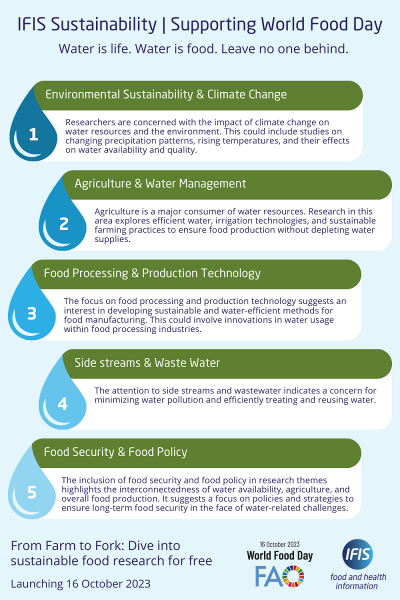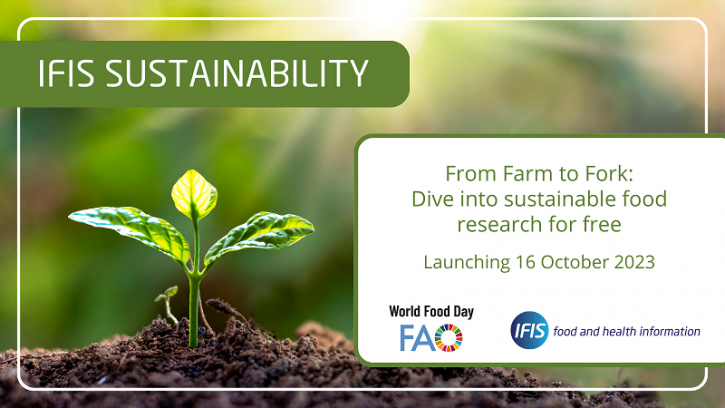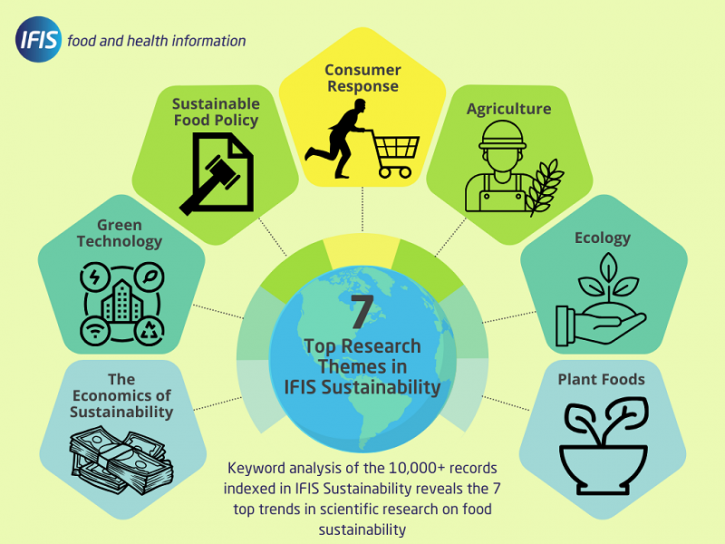Guest article
Unleashing sustainable food science: A catalyst for innovation and collaboration

The intricate interplay of environmental concerns, economic considerations, and societal well-being demands a swift and transformative response. In this era of change, collaboration and knowledge-sharing are not just virtues; they are indispensable tools for accelerating the pace of innovation toward a more sustainable food system.
At the heart of this call for innovation is the recognition that our current practices are not sustainable in the long run. We face a critical juncture where our choices will shape not only the future of food but the health of our planet and communities.
The need to ensure the response is inclusive and collaborative is at the heart of this year’s World Food Day message: “Water is Life, Water is Food. Leave No One Behind”. In this spirit, and recognising the need for urgent change, IFIS Publishing has launched IFIS Sustainability in support of FAO’s World Food Day and the Sustainable Development Goals.
IFIS Sustainability is a free Abstracting and Indexing (A&I) database created by the not-for-profit educational publisher. It is not merely a repository of scientific research; it is a catalyst for change. The innovative platform offers a curated collection of over 10,000 records, continually updated to provide a rolling 6-month snapshot of the latest in sustainable food science.
It is the world’s first free database of sustainable food science. But what really sets it apart is the meticulous vetting process led by IFIS Publishing's team of food and data scientists. By excluding predatory content, the database ensures that users access trustworthy, reliable information—a crucial foundation for informed decision-making.
“It is absolutely critical that F&B innovators have access to the latest, trustworthy science to learn from and build on the work of others and bring people together in collaborative efforts,” Cindy Steward (PhD), Global Innovation and R&D Executive and IFT Past President, noted.
Steward, who is a member of the IFIS Corporate Advisory Board, continued: “The solutions require multi-disciplinary approaches. It’s great to have a focused database for scientists and others to easily access sound science.”
Multidisciplinary database shows key areas of research
As we delve into the pressing need for sustainable food innovation, it is essential to recognize the key themes shaping current research. IFIS Sustainability mirrors the industry's focus on these critical areas, offering a glimpse into the dynamic landscape of sustainable food science.
Economics of Sustainability: Researchers are exploring practical approaches that not only address environmental concerns but also make economic sense within the broader food market. Achieving sustainability requires solutions that are financially viable and scalable.
Technological Advancements: The database reflects a keen interest in leveraging technology for more efficient and sustainable practices in food processing, packaging, and other areas. Innovations in technology play a pivotal role in reshaping the future of food.
Policy-Driven Sustainability: The emphasis on regulatory frameworks highlights the acknowledgment that sustainable goals need supportive policies. Advocating for and developing policies that promote sustainability across the food supply chain is a key focus.
Ecological Concerns: Understanding and mitigating the environmental impact of food production is paramount. Researchers are exploring ways to reduce the ecological footprint of agriculture and food processing, promoting practices that are environmentally friendly.
Consumer-Centric Approaches: Consumers play a crucial role in driving sustainability. The database delves into understanding how consumer behaviour can be influenced to support sustainable choices, whether through transparent labelling or strategic marketing.
Innovations in Agriculture: Sustainable farming practices are at the heart of sustainable food innovation. The database showcases innovations in precision agriculture, organic farming methods, and other approaches promoting sustainable agriculture while ensuring food security.
Plant-Based Solutions: Reflecting the growing interest in plant-based diets, the database explores the environmental benefits of plant-based diets and sustainable plant-based products. It addresses the challenges and opportunities associated with a shift toward plant-based consumption.
The launch of IFIS Sustainability comes at a critical time for the food system, which is facing myriad challenges as innovators work to transition toward sustainable methods of production and consumption.
“The most pressing sustainability challenge for the F&B industry is for companies and organizations to establish, and continually update, the evidence base for the most sustainable ingredients, processes, and products," explained Professor Colin Dennis, chairman of IFIS Publishing and the Leadership Development Committee at IFT.
In the pursuit of a sustainable future, collaboration becomes our most potent weapon. The decision to offer IFIS Sustainability as a free-to-access tool aligns with IFIS Publishing's mission to champion the information needs of the food science community. By breaking down financial barriers, the database becomes a shared resource, inviting researchers, policymakers, and stakeholders to contribute to a collective effort for a sustainable and water-efficient food system.
Dennis continued: “It is essential that innovators have access to the latest trustworthy science and technology to avoid wasting resources on re-inventing what is already known. IFIS Sustainability provides access to a professionally curated and highly searchable database of trustworthy science and technology and is an excellent resource for such a purpose.”
Sustainable food science innovation is not just a pathway to a more resilient and ethical food system; it is a shared responsibility. As we navigate the intricate web of challenges, the power to innovate sustainably lies not in isolation but in our ability to build on our collective knowledge—a knowledge that IFIS Sustainability is dedicated to curating and sharing for the greater good.
For free access to the IFIS Sustainability platform, register here.










